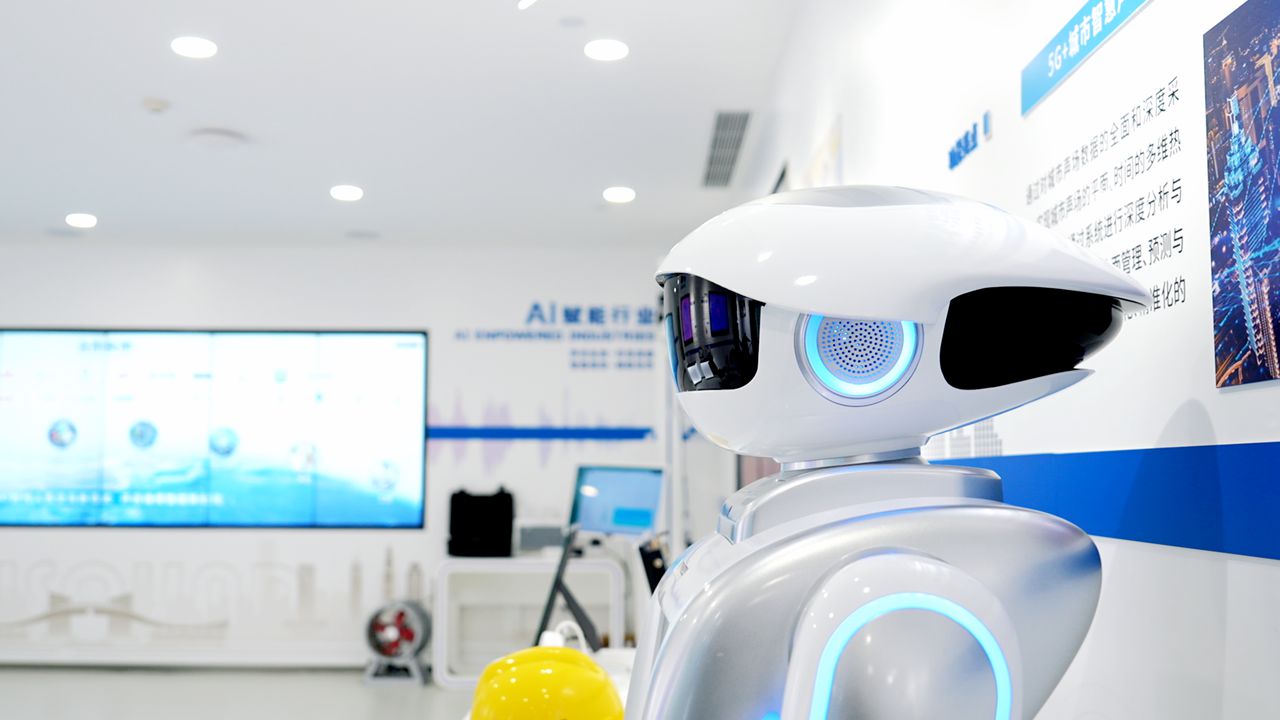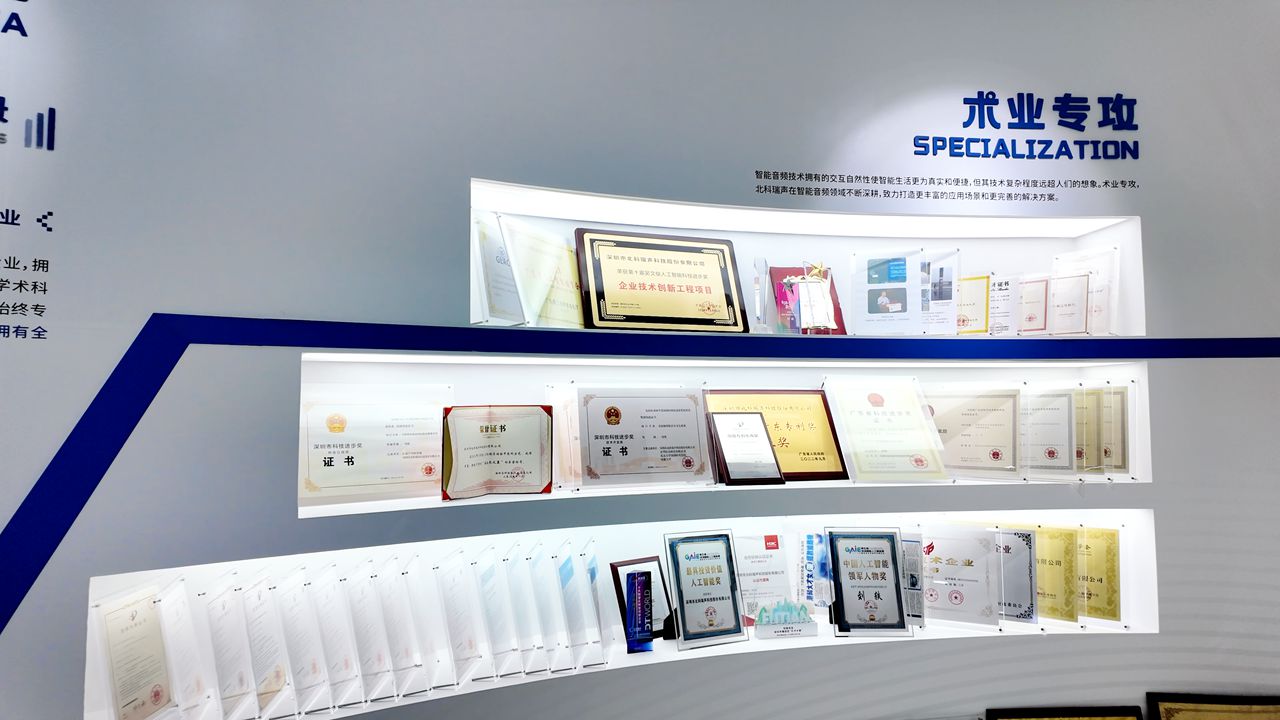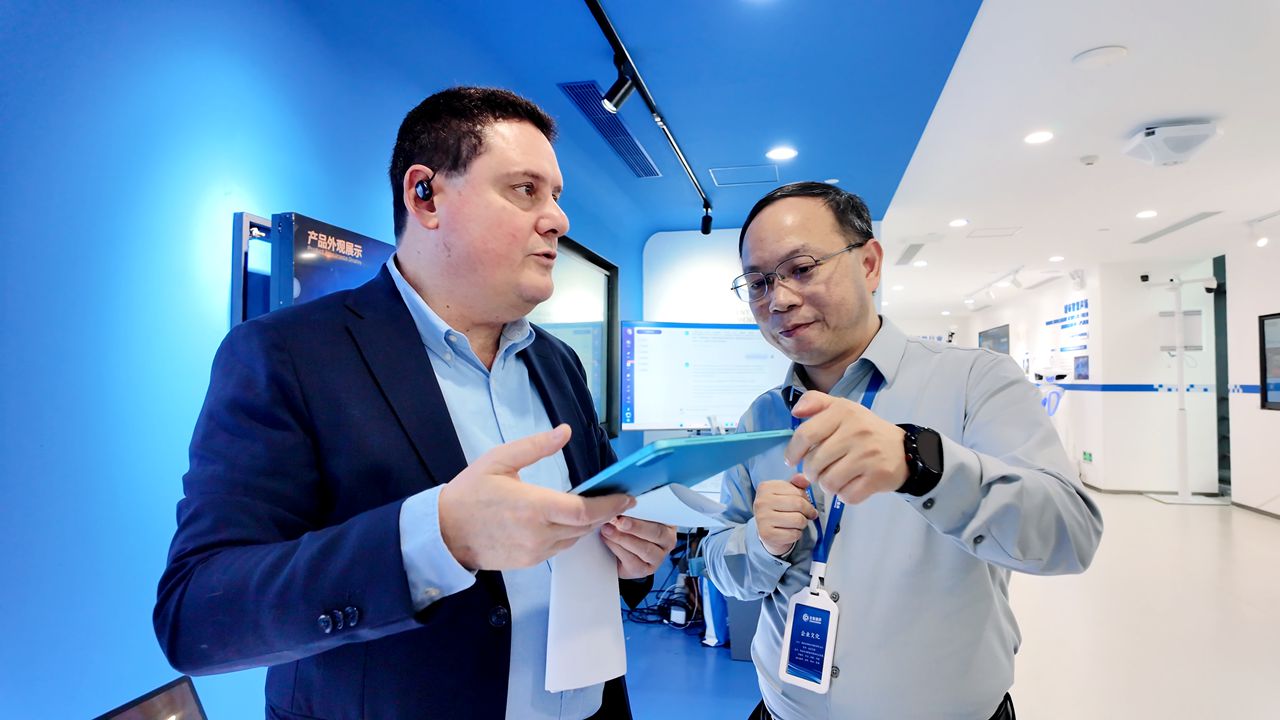Shenzhen AI voice tech firm safeguards data privacy in digital era
Writer: Chen Siqi | Editor: Zhang Zhiqing | From: Original | Updated: 2025-04-22
Video by Xu Shuntian
When every voice command risks exposing your privacy in the digital era, how can security be ensured?
Shenzhen Raisound Technology Co., a Shenzhen-based AI voice interaction technology company, provides innovative solutions to this challenge.
The company’s on-device voice interaction technology redefines security through end-to-end local data processing, delivering instant response and internet-independent reliability across applications ranging from health care and wearables to smart cockpits and confidential meetings.
Founded in 2008 in Shenzhen, the company specializes in on-device voice technology and large language models (LLMs), offering intelligent interaction solutions through integrated hardware and software systems.

An audio guide robot powered by Raisound technology is displayed at the company’s exhibition hall. Xu Shuntian
Recognized as a nationally accredited “little giant” enterprise in 2023 — a title honoring specialized, sophisticated innovators — Raisound holds over 300 intellectual property rights and has received China’s prestigious Wu Wenjun Artificial Intelligence Award, China’s highest award for AI science & technology.
The company has established strategic partnerships with global leaders including Intel, Alibaba, AOC, and ByteDance’s Volcano Engine cloud service. Raisound has also contributed to the creation of two national standards for intelligent speech recognition and interaction.
Considering the company’s cutting-edge technology, Shenzhen Daily partnered with ChinaEU, a business association promoting Sino-European tech cooperation, to interview Raisound about its journey and vision.
From startup to industry leader
When Raisound was launched in 2008, AI voice technology was immature, and few companies had successfully commercialized AI products. Undeterred, co-founder Liu Yi and his partners pursued voice interaction research and development (R&D) to innovate and explore market opportunities.
“Shenzhen is one of the world’s leading cities for [IT technology]. So, this is one of the most important reasons for us to choose Shenzhen for settling the company,” explained Huang Shilei, Raisound’s vice president and CTO.
Capitalizing on AI’s growing popularity, the company developed intelligent voice applications for vehicle-mounted systems and conference solutions, among others. Discussing their product-development strategy, Huang said, “If a company wants an AI product to be truly used by consumers, it must be combined with specific industries.”

An array of honors and certificates are displayed in the company’s exhibition hall. Xu Shuntian
This philosophy led Raisound to focus on niche sectors like health care, transportation, and government services where generic speech recognition often failed — particularly with technical terms like medication names. By solving these specialized challenges, the company gained its competitive edge.
In 2022, Raisound’s annual revenue exceeded 100 million yuan (US$13.79 million), with a year-on-year growth rate of over 56%. It achieved remarkable growth in 2024, with both revenue and profit experiencing more than 50% year-on-year increases.
Technological breakthroughs
Algorithm engineer Liao Chen outlined Raisound’s five core audio technologies, which are all related to audio processes, including automatic speech-to-text, text-to-speech, speaker dualization that can differentiate between speakers, voice cloning to create natural-sounding synthetic voices, and machine translation to handle multiple languages.
Raisound’s proprietary technology addresses key challenges in speech recognition accuracy, which is particularly difficult for audio processing companies given that there are more than 50 regional Mandarin accents. Beyond accent recognition, the system must also interpret the speaker’s intended meaning to deliver precise results.
To solve these challenges, Raisound has continuously enhanced its capabilities in three key areas: data processing, algorithm development, and computing power optimization.

Chen Lin (R), deputy general manager of Raisound, demonstrates to Luigi Gambardella, president of ChinaEU, the application of the company’s on-device voice interaction technology at the company’s exhibition hall in Next Park in Meilin, Futian District in March. Xu Shuntian
Liao also pointed out that one of the most outstanding parts of Raisound’s technology is that it can provide customers with a high level of data security and privacy.
“All processing occurs on-device, eliminating cloud dependencies and privacy risks,” Liao explained. The modular design enables fully offline operation, with optional cloud features requiring explicit user consent. “This allows sensitive industries to leverage advanced technology without compromising security.”
During a 2024 speech, Liu Yi announced that Raisound had successfully integrated large AI models into smartphones, computer mice, and other devices. This innovation combines speech recognition, speech generation, and LLM technologies.
The system enables users to interact with smart devices — including dictating medical records — with an impressive response time under 100 milliseconds. The company has since expanded these applications, incorporating the technology into smart toys and clothing through partnerships with various brands.
Global expansion
In 2023, China’s AI voice interaction market was valued at 15-20 billion yuan, with a year-on-year growth rate of 30%-40%, according to data from iResearch. Globally, the AI voice interaction market was worth US$20.25 billion in 2023 and has grown at 25%-30% annually, according to data from Grand View Research.
Regarding international expansion, deputy general manager Chen Lin stated, “We balance R&D with global growth.” Raisound has successfully made forays into Middle Eastern and Southeast Asian markets by adapting to regional needs — luxury smart home systems for the former and cost-effective solutions for the latter.
A collection of plush toys embedded with Raisound’s AI solutions. Xu Shuntian
The European market presents significant potential given its stringent data privacy requirements, a situation that plays to Raisound’s strengths. The company’s technology is particularly well-suited to address the privacy concerns of European consumers and businesses, giving it a competitive advantage in gaining market recognition and trust.

Chen Lin (2nd L), deputy general manager of Raisound, introduces a toy rabbit equipped with Raisound’s AI voice system to Luigi Gambardella, president of ChinaEU. Lin Jianping
“If Raisound expands into the European market, we would prioritize partnerships with automobile manufacturers and smart home brands,” said Chen.
Luigi Gambardella, president of ChinaEU, said after the interview that Shenzhen is globally recognized as a high-tech innovation hub. While people often associate the city with big players like Tencent and Huawei, the reality is that Shenzhen is also home to many highly innovative companies with tremendous potential, and Raisound is one of them.